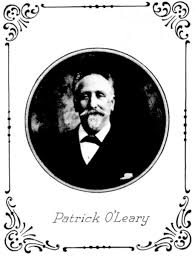Annotation:Miss Rochelle Rudoph's Hornpipe: Difference between revisions
(Created page with "=='''Back to [[{{BASEPAGENAME}}]]'''== ---- <p><font face="garamond, serif" size="4"> '''MISS ROCHELLE RUDOLPH'S HORNPIPE.''' Irish, Hornpipe (4/4 time). D Major. Standard tun...") |
m (Text replacement - "garamond, serif" to "sans-serif") |
||
| Line 1: | Line 1: | ||
=='''Back to [[{{BASEPAGENAME}}]]'''== | =='''Back to [[{{BASEPAGENAME}}]]'''== | ||
---- | ---- | ||
<p><font face=" | <p><font face="sans-serif" size="4"> | ||
'''MISS ROCHELLE RUDOLPH'S HORNPIPE.''' Irish, Hornpipe (4/4 time). D Major. Standard tuning (fiddle). AABBCC. The tune was composed by fiddler Patrick O'Leary, a native of County Cavan (b. 1851) who emigrated as a youth to Australia, on the occasion of the first visit of a relative (for whom the hornpipe was named) to his new country. O'Leary rose to the position of head attendant of Mental Hospital, Parkside, Adelaide. O'Neill devoted several pages (pp. 379-384) to the fiddler and his anecdotes in his '''Irish Minstrels and Musicians''' (1913), and inserted a photograph of him as well. [[File:o'leary2.jpg|300px|thumb|right|]] | '''MISS ROCHELLE RUDOLPH'S HORNPIPE.''' Irish, Hornpipe (4/4 time). D Major. Standard tuning (fiddle). AABBCC. The tune was composed by fiddler Patrick O'Leary, a native of County Cavan (b. 1851) who emigrated as a youth to Australia, on the occasion of the first visit of a relative (for whom the hornpipe was named) to his new country. O'Leary rose to the position of head attendant of Mental Hospital, Parkside, Adelaide. O'Neill devoted several pages (pp. 379-384) to the fiddler and his anecdotes in his '''Irish Minstrels and Musicians''' (1913), and inserted a photograph of him as well. [[File:o'leary2.jpg|300px|thumb|right|]] | ||
<br> | <br> | ||
<br> | <br> | ||
</font></p> | </font></p> | ||
<p><font face=" | <p><font face="sans-serif" size="4"> | ||
''Source for notated version'': Patrick O'Leary (Eastwood, Parkside, Adelaide, South Australia) [O'Neill]. O'Leary's brother and sister resided in Chicago and were friends of collector Frances O'Neill's, who heard O'Leary's phonograph recordings at their home when he visited the siblings. | ''Source for notated version'': Patrick O'Leary (Eastwood, Parkside, Adelaide, South Australia) [O'Neill]. O'Leary's brother and sister resided in Chicago and were friends of collector Frances O'Neill's, who heard O'Leary's phonograph recordings at their home when he visited the siblings. | ||
<br> | <br> | ||
<br> | <br> | ||
</font></p> | </font></p> | ||
<p><font face=" | <p><font face="sans-serif" size="4"> | ||
''Printed sources'': O'Neill ('''Waifs and Strays of Gaelic Melody'''), 1922; No. 360, p. 184. | ''Printed sources'': O'Neill ('''Waifs and Strays of Gaelic Melody'''), 1922; No. 360, p. 184. | ||
<br> | <br> | ||
<br> | <br> | ||
</font></p> | </font></p> | ||
<p><font face=" | <p><font face="sans-serif" size="4"> | ||
''Recorded sources'': <font color=teal></font> | ''Recorded sources'': <font color=teal></font> | ||
</font></p> | </font></p> | ||
Latest revision as of 14:23, 6 May 2019
Back to Miss Rochelle Rudoph's Hornpipe
MISS ROCHELLE RUDOLPH'S HORNPIPE. Irish, Hornpipe (4/4 time). D Major. Standard tuning (fiddle). AABBCC. The tune was composed by fiddler Patrick O'Leary, a native of County Cavan (b. 1851) who emigrated as a youth to Australia, on the occasion of the first visit of a relative (for whom the hornpipe was named) to his new country. O'Leary rose to the position of head attendant of Mental Hospital, Parkside, Adelaide. O'Neill devoted several pages (pp. 379-384) to the fiddler and his anecdotes in his Irish Minstrels and Musicians (1913), and inserted a photograph of him as well.

Source for notated version: Patrick O'Leary (Eastwood, Parkside, Adelaide, South Australia) [O'Neill]. O'Leary's brother and sister resided in Chicago and were friends of collector Frances O'Neill's, who heard O'Leary's phonograph recordings at their home when he visited the siblings.
Printed sources: O'Neill (Waifs and Strays of Gaelic Melody), 1922; No. 360, p. 184.
Recorded sources:
